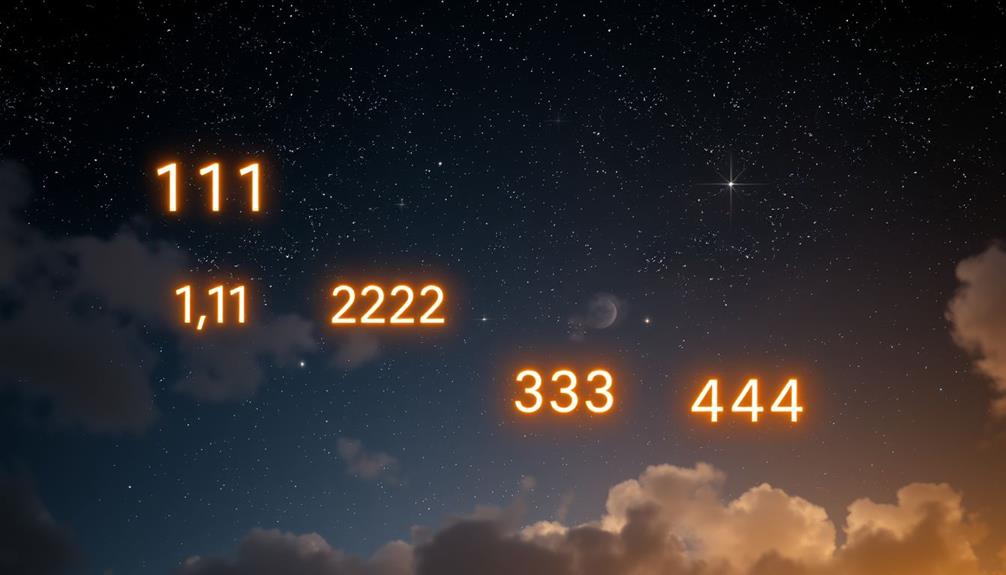You can explore the idea of angel numbers within an Islamic context, but it's important to remember that true guidance comes from the Quran and Sunnah, not from numerology. While some might find meaning in these numbers, Islam emphasizes reliance on Allah over superstitions. Engaging with angel numbers can be permissible as long as it doesn't distract you from your faith or lead to harmful beliefs. Numbers do play significant roles in rituals, but their meanings should align with Islamic principles. If you're curious about how this fits into your beliefs, there's much more to uncover.
Key Takeaways
- Angel numbers are sequences believed to convey spiritual messages, but Islam emphasizes guidance from the Quran and Sunnah instead.
- Engaging with angel numbers is permissible if it doesn't conflict with Islamic teachings, but reliance on Allah is paramount.
- Islam rejects predictive beliefs tied to angel numbers, asserting that only Allah knows future events.
- Superstitions related to numbers can distract from faith, emphasizing reliance on divine guidance through righteous deeds.
- Certain numbers hold significance in Islamic rituals, but they lack inherent spiritual meaning outside of established religious practices.
Definition of Angel Numbers

Angel numbers are captivating sequences of three or four digits that many believe convey spiritual messages. You might notice these numbers popping up in everyday situations, like on license plates, clocks, or receipts. While they may seem random, people often interpret these occurrences as meaningful, believing they carry divine guidance tailored for them.
Each sequence of angel numbers is thought to have a specific meaning, prompting you to explore interpretations that resonate with your current life experiences. For instance, the number 111 might signal new beginnings, while 777 could suggest spiritual awakening. These interpretations often provide comfort and reassurance during challenging times, helping you navigate vital decisions.
The concept of angel numbers suggests that these messages can offer valuable insights into your life path, encouraging you to pay attention to the synchronicities around you.
However, it's important to remember that interpretations can vary widely, and personal significance plays a key role. Ultimately, while many find solace in the idea of angel numbers, the interpretations are subjective and should be approached with an open mind.
Islamic View on Angel Numbers

When you think about angel numbers, it's crucial to understand how Islam views them.
While you can reflect on these numbers, the faith emphasizes that true guidance comes from the Quran and Sunnah, rather than relying on numerology.
Engaging with signs may be permissible, but it should always align with Islamic teachings and not distract from your reliance on Allah.
Definition of Angel Numbers
The concept of angel numbers refers to repetitive sequences of digits that many believe convey spiritual or divine messages. These sequences typically consist of three or four digits and are often seen in daily life, like on clocks or license plates. Some individuals view these numbers as signs from the universe or as lucky numbers. The interpretation of these numbers often depends on the specific sequence, with each set believed to hold a unique meaning or guidance. For instance, seeing 111 might signify new beginnings, while 222 could represent balance or harmony. Some also find meaning in angel numbers in double digits, believing that even shorter sequences like 11 or 22 carry significant spiritual energy and messages tailored to the observer’s life path.
However, it's crucial to understand that the belief in angel numbers isn't supported by Islamic teachings. In Islam, the idea of predicting the future through angel numbers is rejected. Knowledge of future events is beyond human capability, and reliance should be on the Quran and Sunnah. Engaging with angel numbers can be seen as Mubah (optional) as long as it doesn't lead to harmful superstitions.
Here's a quick overview of angel numbers:
- Often appear as repetitive sequences.
- May include odd numbers or patterns.
- Considered by some as lucky numbers.
- Not recognized in Islamic doctrine.
- Emphasis on seeking guidance from reputable sources.
Ultimately, understanding angel numbers requires discernment and a focus on foundational Islamic teachings rather than numerological interpretations.
Islamic Interpretation of Signs
In Islam, interpreting signs and numbers through a mystical lens isn't supported, as true knowledge of the future rests solely with Allah. The concept of angel numbers, which often suggests predictive power or divine messages, doesn't align with Islamic teachings. Instead, you should focus on the Quran and Sunnah for guidance.
Relying on signs or numbers can lead to superstition, diverting you from the right track. Islam emphasizes that all matters are governed by Allah's will. While some may find the idea of engaging with angel numbers Mubah (optional), it's essential to make sure it doesn't lead to harm or deviate from Islamic principles.
Questions about angel numbers arise often in the community, but scholars recommend seeking knowledge through formal education. If you're curious about how Islamic teachings approach signs, visit our website for more insights.
Cultural Beliefs vs. Islamic Teachings

When you explore the relationship between numerology and Islamic views, it's clear that cultural interpretations can often clash with religious teachings.
While some may find meaning in angel numbers, Islam encourages you to focus on faith and guidance from Allah instead.
Understanding this distinction can help you navigate your beliefs without losing sight of Islamic principles.
Numerology and Islamic View
Many people find comfort in the idea that numbers can convey special messages or guidance, often through concepts like angel numbers. However, in Islam, this belief is generally viewed as superstition. You're encouraged to rely on Allah's will for guidance rather than seeking meaning in numbers.
Here are some key aspects of the Islamic view on numerology:
- Superstition vs. Faith: Engaging with angel numbers contradicts the core Islamic principle of placing trust in Allah.
- Knowledge Limitations: The future is known only to Allah, and humans can't predict events through numbers.
- Functional Roles: In Islam, numbers have practical purposes in rituals, rather than inherent spiritual significance.
- Guidance Sources: The Quran and Sunnah are your primary references for guidance, steering you away from numerological interpretations.
- Avoiding Omens: Consulting fortune tellers or interpreting numbers as omens is discouraged, emphasizing clear faith and intention.
Cultural Interpretations of Numbers
Cultural interpretations of numbers often clash with Islamic teachings, as various societies attribute unique spiritual meanings to specific sequences. Many cultures see numbers as carriers of spiritual significance, leading to beliefs like angel numbers conveying divine messages.
However, in Islam, reliance on Allah is paramount, and superstitions surrounding numbers can detract from this foundational belief. Islam explicitly discourages practices that predict the future, as this is beyond human capability.
While certain numbers, like seven, hold ritual importance in Islamic practice, this significance is rooted in tradition rather than superstition or luck. It's essential to recognize that Islam promotes faith, intention, and divine guidance over numerological systems.
Engaging with cultural beliefs about numbers can lead to confusion, especially when they undermine the essence of Islamic teachings. Instead of seeking meaning in number sequences, focus on strengthening your connection with Allah and adhering to the principles of Islam.
The Role of Superstition

Superstition plays a complex role in various belief systems, but in Islam, it's largely viewed as a distraction from true faith. Engaging in practices like attributing significance to angel numbers can divert your attention from the core teachings of Islam.
The religion emphasizes that all matters are under Allah's control, and relying on superstitions undermines that belief.
Consider these points:
- Superstitions contradict the reliance on Allah's will.
- Numerological practices aren't endorsed within Islamic teachings.
- The Quran states that knowledge of the future belongs solely to Allah.
- Seeking signs in numbers can mislead you from divine guidance.
- Islamic scholars encourage focusing on faith and righteous deeds instead.
Significance of Numbers in Islam

Numbers hold a unique place in Islamic practices, often serving specific roles in rituals and traditions. For instance, the number three is significant in various acts of worship, like washing before prayers, where you perform the ablution three times. This emphasis on the number shows how it enhances your spiritual preparation.
The number seven also holds a special status in Islam. During Hajj, you circumambulate the Kaaba seven times, symbolizing the unity of believers in worship. Additionally, there are references to seven gates of paradise, which signify the importance of endeavoring for a virtuous life.
Another notable number is 786, which many Muslims use to represent the phrase "In the name of God, the beneficent, the merciful." This usage derives from the numerical values assigned to the Arabic letters, highlighting the connection between numbers and spirituality.
Understanding Specific Numbers

Throughout your spiritual journey in Islam, understanding specific numbers can deepen your appreciation of their significance in rituals and practices.
While angel numbers are often seen as spiritual messages, Islam doesn't support the idea of predicting future events through numbers. Instead, you'll find that certain numbers hold importance based on their roles in Islamic traditions.
Here are a few numbers to reflect upon:
- Three: Represents the completion of certain rituals, like the three days of Eid al-Adha.
- Seven: Essential in practices, such as the seven circumambulations of the Kaaba during Hajj and the seven gates of paradise.
- 786: Used to symbolize "In the name of God, the beneficent, the merciful" but is more about intention than superstition.
- Ninety-nine: Represents the names of Allah, emphasizing His attributes and qualities.
- One: The concept of Tawhid, or the oneness of God, underscores the foundation of Islamic belief.
Community Perspectives and Inquiries

Many community members are curious about the intersection of angel numbers and Islamic teachings, seeking clarity on their meanings and implications. This interest often leads to inquiries about how these numbers align with Islamic beliefs and practices.
The Imam Al-Khoei Foundation plays an essential role in addressing these questions, promoting understanding and guidance in spiritual matters. Community members can reach out through open communication channels at the foundation to discuss their concerns about angel numbers and other related spiritual topics.
The foundation emphasizes the importance of maintaining the Islamic spirit during these discussions, aiming to prevent misunderstandings or the spread of superstitions.
It's imperative for you to seek knowledge and rely on Islamic teachings rather than personal interpretations of numerology or angel numbers. By doing so, you can guarantee that your understanding aligns with your faith and values.
Engaging with knowledgeable sources can provide you with a clearer perspective, helping you navigate the complexities of spiritual inquiries. Remember, fostering open dialogue within the community can lead to greater awareness and understanding, allowing everyone to explore their spiritual paths with confidence and clarity.
Seeking Guidance From Scholars

Understanding the role of qualified scholars is vital when exploring spiritual concepts like angel numbers. When you investigate these topics, it's important to seek guidance from knowledgeable individuals who can help clarify Islamic teachings. Engaging with scholars guarantees your beliefs align with the Quran and Sunnah, steering clear of potential misunderstandings or superstitions.
Here are some key reasons to consult scholars:
- Expertise: Scholars possess deep knowledge of Islamic texts and can provide accurate interpretations.
- Guidance: They help you navigate complex spiritual matters, offering insights grounded in Islamic tradition.
- Community Support: Institutions like the Imam Al-Khoei Foundation encourage open discussions and questions.
- Avoiding Misconceptions: Scholars can distinguish between acceptable beliefs and those that may veer into superstition.
- Strengthening Faith: Engaging with knowledgeable figures can deepen your understanding of spirituality and enhance your faith.
Frequently Asked Questions
Is an Angel Number Allowed in Islam?
You might wonder if angel numbers are allowed in Islam. While it's generally viewed with skepticism, engaging with them isn't outright forbidden.
If you find personal meaning in them without straying from your faith, it's considered Mubah, or optional. However, focusing on the Quran and Sunnah for guidance is essential.
Ultimately, prioritizing righteous deeds and deepening your understanding of Islam is more beneficial than getting caught up in numerological interpretations.
Do Muslims Believe in Numbers?
You might find that Muslims have a unique perspective on numbers. While certain numbers hold cultural or ritual significance, like three and seven, they don't typically associate them with luck or superstition.
Instead, numbers in Islam serve functional roles, emphasizing faith and intention. Concepts like numerology aren't embraced, as Muslims believe true reliance should be on Allah's will rather than on any number's supposed power to influence events.
Is Numerology Allowed in Islam?
Did you know that around 60% of Muslims believe that engaging with numerology might lead to confusion in faith?
In Islam, numerology's seen as haram, as it involves predicting the future, which is solely in Allah's hands. Superstitions tied to numbers can distract you from authentic guidance, like the Quran and Sunnah.
Instead of focusing on numerical meanings, concentrate on righteous deeds and deepening your relationship with Allah for true spiritual fulfillment.
What Is the Sacred Number in Islam?
In Islam, the number seven is particularly sacred, symbolizing completeness and perfection.
You'll notice its significance in rituals, like circling the Kaaba seven times during Hajj.
Additionally, the number one represents the oneness of God, reinforcing the central belief in monotheism.
Odd numbers are favored in practices, reflecting a deeper spiritual meaning.
While some numbers hold importance, the concept of "lucky numbers" isn't officially recognized in Islamic teachings.
Conclusion
In traversing the delicate threads of faith and belief, you find that angel numbers can evoke curiosity within the Islamic framework. While some may see them as whispers from the divine, it is crucial to stay anchored in the teachings of Islam. Embrace the significance of numbers within your faith, but tread carefully, lest superstition lead you astray. Ultimately, seeking guidance from knowledgeable scholars illuminates your path, ensuring your spiritual journey remains true to its roots.









